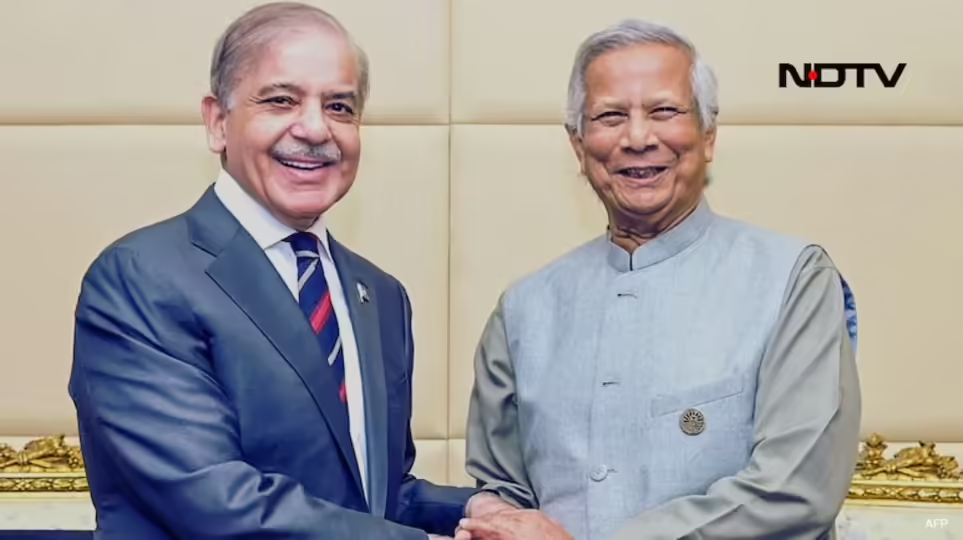Bangladesh and Pakistan: A Growing Friendship or a Risky Alliance? What Lies Ahead?
Mon, 3 Feb 2025

In recent years, the relationship between Bangladesh and Pakistan has been a topic of much discussion and debate. While diplomatic ties between nations are often seen as a positive step toward regional cooperation, the growing closeness between Bangladesh and Pakistan has raised eyebrows and sparked concerns among political analysts and observers. The question on many minds is whether this friendship is a strategic move or a potential risk for Bangladesh, a country that has worked hard to establish its identity and independence on the global stage. Bangladesh, a nation born out of a bloody struggle for independence in 1971, has always shared a complicated history with Pakistan. The memories of the Liberation War, during which Bangladesh fought to break free from Pakistani rule, remain deeply ingrained in the collective consciousness of its people. The war, marked by immense suffering and loss, was a defining moment in Bangladesh's history, shaping its national identity and its approach to international relations. For decades, the relationship between the two nations has been strained, with unresolved issues and lingering tensions. However, recent developments suggest a shift in dynamics, with both countries making efforts to improve bilateral ties. The warming of relations between Bangladesh and Pakistan has been gradual but noticeable. High-level visits, cultural exchanges, and economic collaborations have been part of this renewed engagement. For Pakistan, strengthening ties with Bangladesh could be seen as an opportunity to expand its influence in South Asia and counterbalance its often tense relationship with India. For Bangladesh, the motivations behind this shift are less clear. Some argue that it is a pragmatic move to diversify its diplomatic and economic partnerships, while others see it as a risky gamble that could have far-reaching consequences. One of the key concerns surrounding this growing friendship is the potential impact on Bangladesh's relationship with India. India, a close ally and neighbor, played a crucial role in Bangladesh's liberation and has been a significant partner in its development journey. Over the years, the two countries have built a strong bond based on shared history, cultural ties, and mutual interests. However, India has long been wary of Pakistan's intentions in the region, and any move by Bangladesh to align more closely with Pakistan could strain its relationship with New Delhi. This delicate balancing act requires careful navigation, as Bangladesh cannot afford to alienate a key ally like India. Another factor to consider is the internal dynamics within Bangladesh. The country has made remarkable progress in recent decades, emerging as a model of economic growth and development in South Asia. Its focus has been on building a stable, prosperous future for its people, and its foreign policy has largely reflected this priority. However, the decision to forge closer ties with Pakistan has sparked debates within the country. Critics argue that such a move could undermine Bangladesh's hard-earned independence and sovereignty, while supporters believe it is a step toward greater regional cooperation. The economic aspect of this relationship cannot be ignored either. Pakistan, like Bangladesh, is a developing nation with its own set of challenges. While there may be opportunities for trade and investment, the benefits of such collaborations remain uncertain. Bangladesh, with its thriving garment industry and growing economy, has much to lose if its partnerships are not carefully managed. The risk of becoming overly dependent on a country with its own economic struggles is a concern that cannot be overlooked. Moreover, the geopolitical implications of this growing friendship are significant. South Asia is a region marked by complex rivalries and shifting alliances. The relationship between India and Pakistan, in particular, has been fraught with tension for decades. Any move by Bangladesh to align more closely with Pakistan could be perceived as taking sides in this longstanding conflict, potentially destabilizing the region further. For a country that has worked hard to maintain a neutral stance and focus on its own development, this is a risk that must be carefully weighed. It is also important to consider the sentiments of the people in both countries. In Bangladesh, the memories of 1971 are still fresh, and many view Pakistan with suspicion and resentment. The idea of closer ties with a nation that was once an oppressor is a sensitive issue, and any move in this direction could face resistance from the public. Similarly, in Pakistan, there are those who view Bangladesh through the lens of past grievances, making it difficult to build a relationship based on trust and mutual respect. Despite these challenges, there are those who believe that improved relations between Bangladesh and Pakistan could have positive outcomes. Regional cooperation, after all, is essential for addressing common challenges such as poverty, climate change, and security threats. By working together, the two nations could potentially create opportunities for growth and stability in South Asia. However, this requires a commitment to transparency, mutual respect, and a willingness to address past grievances. In conclusion, the growing closeness between Bangladesh and Pakistan is a development that warrants careful consideration. While there may be potential benefits to this relationship, the risks cannot be ignored. Bangladesh, as a nation that has fought hard for its independence and sovereignty, must tread carefully in its diplomatic engagements. The decisions it makes today will have far-reaching implications for its future, both domestically and on the global stage. As the world watches this evolving relationship, one thing is clear: the stakes are high, and the path forward is fraught with challenges. Only time will tell whether this friendship will prove to be a boon or a bane for Bangladesh.
